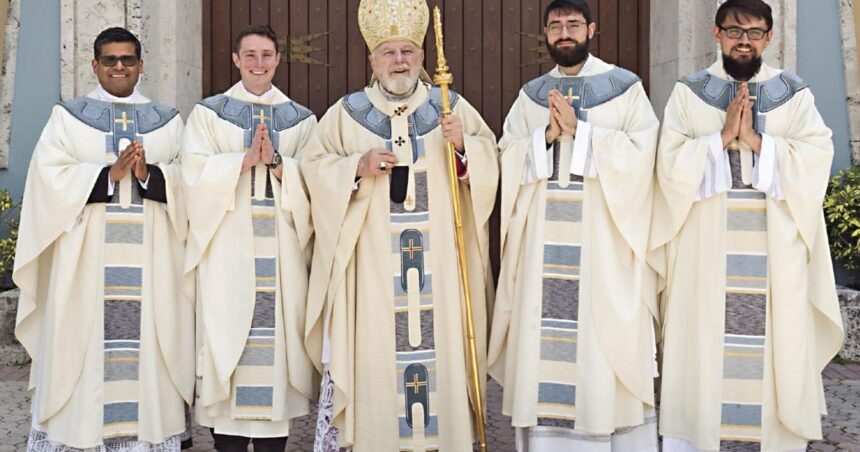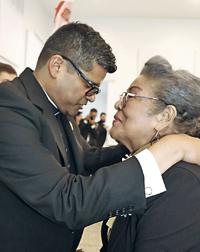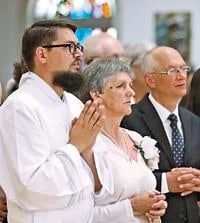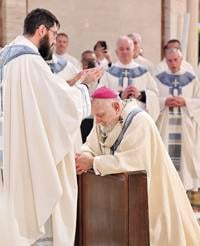MIAMI | This year’s ordination class came to the priesthood from as far as Europe and Central America, and as close as New York — all four with a commitment to serve God and his people.
Archbishop Thomas Wenski ordained these four men to the archdiocesan priesthood May 11, 2024, at St. Mary Cathedral. The ceremony was livestreamed on the archdiocesan website.
Following are brief profiles of the new priests. Video interviews are posted on the archdiocesan website.
FATHER JOHN E. BUONOCORE:
‘GET THE MAN RIGHT’

Deacon John Buonocore stands with his parents, John Buonocore and Dolorita Sweeney, at the start of the ceremony where Archbishop Thomas Wenski ordained him and three others to the priesthood, May 11, 2024, at St. Mary Cathedral in Miami.
For Father John Edward Buonocore, a simple parable helped move him toward the priesthood.
In 2013, he was listening to a homily at Our Lady of Lourdes Church in Miami, where Msgr. Andrew Anderson shared the story of a father who tore up an ad with a picture of the world and told his son to reassemble it. To the man’s surprise, the boy got the map together quickly. When asked how, the child said he saw a picture of a man on the other side of the paper. The priest’s lesson: “If you get the man right, you get the world right.”
Father Buonocore, 31, said it made him ask some questions: “What kind of man do I want to be? What does God want me to do? Just a career, or give myself to the Lord?”
His family provided fertile soil for such questions. Born on Long Island, New York, Father Buonocore attended Mass on Sundays, plus confession for Christmas and Easter. He also attended a Catholic high school in Mineola. And his family prayed the rosary on Sunday nights, and on road trips.
“I was always thinking of (becoming a priest), but I never had the courage to respond,” he confessed.
After graduation, Father Buonocore attended the University of Miami in Coral Gables, studying biomedical engineering. There, he went to Mass and took part in the Catholic Campus Ministry.
Even then, though, the activities were “more like a check in the box for being Catholic,” he said.
Msgr. Michael Carruthers, UM’s chaplain, helped change his mind. “He became a model for me. Seeing him preach and interact with people, I thought, ‘I could do that.’”
He undertook graduate studies at Texas A&M and earned a master’s degree in 2017 in electrical engineering. But the priesthood question still nagged.
“I decided that if I still felt like that at the end of college, I would join,” Father Buonocore said. “But it wouldn’t go away.”
He entered St. John Vianney College Seminary and, after a “discernment weekend” there, he finally said, “OK, wherever you want me to go.”
His catechetical assignments helped reaffirm he’d done the right thing. He served at churches in Miami, Hialeah and Hollywood. He enjoyed both serving at Masses and being with people in daily life.
“They come to you for guidance and spiritual direction,” Father Buonocore said. “God uses you to help them grow.”
He learned also from his chaplaincies behind bars: first at the South Bay Correctional Facility near Lake Okeechobee, then at the Palm Beach Juvenile Detention Center. A big lesson: Take time with people, let them open up.
A teen told him his mother had bought him shoes; then he confessed that he’d stolen them. Another inmate quoted scripture, about the light shining in the darkness.
“A lot of them spend more time reading the Bible than I do,” Father Buonocore marveled. “I sometimes learned more from them than in my classes. We take Jesus into dark places, but we find Jesus is already there.”
Father Buonocore said both he and his family were looking forward to his ordination: his parents, aunts, uncles, three siblings and 10 cousins from Houston and Chicago.
Is he right for the job, as the parable said? “I think I’m becoming better. God’s never done with us. There are always more ways to grow.”
FATHER MILTON J. MARTÍNEZ BLASS:
THE CHURCH HUGGED BACK
When Father Milton José Martínez Blass told his mother he wanted to become a priest, she replied, “I’m going to lose another son.”

Newly ordained Father Milton Martínez blesses his mother, Miriam Blass, after his ordination. He was one of four men ordained by Archbishop Thomas Wenski May 11, 2024, at St. Mary Cathedral.
She’d already given up a lot in bringing him to the United States. in 1988, fleeing the communist regime in Nicaragua. Her husband and a half-sister stayed behind. A son had died at six months old.
“I told her I would still be her son,” he said. “But she understood that I was pursuing my calling.”
Even as a boy, Father Martínez Blass felt a pull to the priesthood. “I felt an attraction when I saw the priest, acting in the person of Jesus Christ, reaching out to people. But we never had a closeness to a priest. So, when I was growing up, I never had an opportunity to speak about it.”
Those thoughts were shelved in the 1980s when Nicaragua’s Sandinista regime began forcing schoolboys into the army. Miriam, Father Martinez Blass’ mother, decided to evacuate her surviving sons and a male cousin. His father, Guillermo, stayed behind to manage their restaurant in Managua.
In Miami, the family attended St. John Bosco Church, which Father Martínez Blass still calls his home parish. As an adult, he became a banker and moved away, attending other churches.
Two decades later, he moved back to the neighborhood, then dropped in for Mass at St. John Bosco. For some reason, though, he felt uneasy, and he was about to leave.
But just before the procession, the pastor, Father Juan Carlos Paguaga, patted him on the shoulder. “Bievenido a casa, hijo (Welcome home, son),” he said.
“That shocked me, and I stayed,” he recalled. “During the homily, I felt like he was talking to me about having courage, faith in God, hope in Christ.”
Father Martínez Blass entered confirmation class, which he’d never done before. He got involved as a catechist and an altar server, and Father Paguaga became his spiritual director.
The open-armed welcome amazed him, he said. “I embraced the Church for the first time, and to my surprise, the Church embraced me back.”
Father Martínez Blass was confirmed in 2013, then entered St. John Vianney College Seminary two years later. He just finished his fourth year at St. Vincent de Paul Regional Seminary.
“A lot of people think seminary puts limitations on your life, but for me it was freeing,” Father Martínez Blass said. “Seminary gives you a lot of tools, like a formation director and spiritual advice. We help each other. But ultimately, it’s the Holy Spirit helping me, to see me as God sees me, with love and mercy. I know who Milton is, a beloved child of God.”
As with other seminarians, Father Martínez Blass has gotten lots of experience in what the priesthood is like. He has served at sites as far flung as St. Thomas the Apostle in Miami, Fresh Meals Program in Key West, and the migrant ministry of the Diocese of Richmond, Virginia.
He said he’s been amazed how people treated seminarians like himself. They just love him and want him to feel welcome. “But I understand that it’s not Milton they are seeing. It’s the ministry, and the hope that is in Christ Jesus.”
Another blessing: Father Martínez Blass’ mother came to accept his vocation. While he was serving during Eucharistic adoration at St. John Bosco, she told him, “I already gave you up to the Lord, and now I bless you. And I want you to do this.”
FATHER PIOTR SAWICKI:
HEALED HEART
Piotr Sawicki had problems of the heart — literally, as he survived two childhood surgeries. But his pain was also figurative — with his distrust of a deity who allowed his family to live in poverty, and who let him endure bullying at school.

Deacon Piotr Sawicki stands with his parents, Teresa and Jack Sawicki, at the start of the ceremony where Archbishop Thomas Wenski ordained him and three others to the priesthood, May 11, 2024, at St. Mary Cathedral in Miami.
“Not until later did the Church help me see that all those events were providential, preparing me for what was coming,” he said.
Father Sawicki, 35, never had to wage the struggles of his grandfather, who worked in the shipyard in Gdansk, Poland, that launched the protest movement against the now-defunct communist government. But he went through his own period of rebellion against God.
It wasn’t because of his upbringing. During his heart surgeries, his father even prayed: “If you keep him, he’s yours.” Indeed, Father Sawicki felt a call to the priesthood as a teen during adoration. “It was an intuition, then relief and a sense of peace.”
Then his distrust pushed it away. “On the one hand, God was good. On the other, the sufferings in my life made me doubt him.”
He sought other routes to security. As a high schooler, he dated, partied, grew his hair long and played bass in a rock band. As an adult, he earned a computer science degree and landed a “dream job” as a system administrator with a computer firm. And he was still frustrated.
“I felt fulfilled at work, had money, and was doing what I liked creatively, but it didn’t answer my deeper longings,” Father Sawicki confessed. “I went to speak with a priest from my childhood.”
The priest, Father Jaroslaw Ropel, recommended catechesis with the Neocatechumenal Way. While attending, Father Sawicki began to feel the love and forgiveness of God, and even that the bad turns in his life would work for the good.
He went deeper at a Neocatechumenal pilgrimage to Budapest, which helped him hold an “internal dialogue with God,” he said.
“I felt deeply loved, with my sins and mistakes. I saw I had a chance to live a fulfilled life. When they asked for vocations, I was more than happy to say publicly that I felt called to the priesthood.”
He went on Neocatechumenal catechist missions, landing him in such diverse places as New Jersey, Arizona, Hawaii and Christmas Island. It was the latter that gave him the most satisfaction, Father Sawicki said.
He found many Hawaiians “comfortable” with their lifestyle and less interested in spiritual matters. On Christmas Island — a dot of land on the equator in the mid-Pacific — people were more aware how little they could rely on.
“It was hot as a furnace, and electricity was precarious,” he said. “And I could see the message bearing fruit. I met a boy who was rebellious and a man who had a mistress. The announcement of the Good News changed their lives. Their faces changed. Their attitudes changed.”
In South Florida, Father Sawicki has served at churches including St. Lawrence in North Miami Beach, St. Katharine Drexel in Weston and St. Ann Mission in Naranja. He regards Our Lady Queen of Martyrs in Fort Lauderdale as his home parish.
He asked Father Ropel, his pastor from Gdansk, to help dress him at the ordination ceremony.
After ordination, where to go? Maybe back to itinerant catechesis?
Father Sawicki just smiled. “I know from experience that when I try to find happiness, I make a mistake. But when I trust myself to the Lord, he does not disappoint.”
FATHER DAVID ZALLOCCO:
FINALLY, THE RIGHT KEY
As a boy, Father David Zallocco found the keys to success: With his parents, be a good kid; with friends, be a clown; with girls, be good at sports.

Archbishop Thomas Wenski receives the first blessing of Father David Zallocco after ordaining him and three others to the priesthood for the Archdiocese of Miami, May 11, 2024, at St. Mary Cathedral.
“Or so I thought,” Father Zallocco, 33, confessed.
In his hometown of Sant’Elpidio a Mare, in eastern Italy, pretty much everyone was on the “conveyer belt,” as he called it: baptism, first Communion, confirmation, youth group. He joined a Neocatechumenal community at 17.
But he acknowledged that it didn’t touch his core. “I always heard ‘God loves you,’ but I never believed it.”
Part of his problem was being an only child, Father Zallocco said. “I was used to being the center of attention, and I tried to replicate that with my friends, in my school, in my parish.”
One day at the age of 16, he drank so heavily that he passed out during a Mardi Gras parade. Next day in school, he beamed to see classmates lining the halls, applauding.
He worked awhile at a local newspaper but couldn’t stand the hectic pace. At 21, he took a dark appraisal.
“I wondered, who loves me?” he said. “My parents, if I was a good kid. My friends, if I was a clown. Girls, but only as a friend. And I never went far in sports. So there was no meaning to life. No love. I was wasting my time. I felt like committing suicide.”
He still managed to go to World Youth Day that year in Madrid and felt the call to the priesthood. “But I didn’t trust the Lord. I felt he would screw me over.”
That changed in 2012, when he walked part of a Compostela pilgrimage (the Camino) in Spain. While trekking the last 100 miles, he fell into conversation with a girl in the group. And he found himself pouring out his feelings of loneliness and lovelessness.
Her simple comment: “Don’t you know there is a God who loves you as you are?”
Yes, he’d heard it before, but this time was different. “This time I was naked, totally sincere,” Father Zallocco said. “I felt heaven open. God loved me as I am. I felt rest, happiness, a peace that nothing can take away.”
Back home, he began attending a pre-vocational center, meeting three times a month with a priest. Eventually he realized that for him, following God meant ordination.
In October 2014, the Neocatechumenal movement sent him to Miami, where he studied at its Redemptoris Mater Seminary in Hialeah. He has done adult catechesis for five churches in the archdiocese: St. Boniface in Pembroke Pines, St. Vincent in Margate, St. Cecilia in Hialeah, Mother of Christ and Good Shepherd in Miami.
Father Zallocco talked fondly about his time, 2019 to 2022, as an itinerant catechist in northern and central California. He drove up and down the state’s central valley, speaking at summer camps and winter campuses, to listeners 12 to 25 years old.
“It was lots of work and sleepless nights, but the best three years of my life,” he said. “I saw how teens suffer as I did. They don’t feel good enough. I could announce to them that God loves them.”
The experience led Father Zallocco to decide to serve as a “missionary priest,” even if he ends up at a parish. His message: There is a hell and a heaven.
“Hell is when I wanted to kill myself,” he said. “And heaven is when I learned that God loves me. I no longer strive to fit in, to prove that I am worth something. There is a God who loves me as I am.”
Appointments
Archbishop Thomas Wenski has made the following appointments:
Effective June 17, 2024:
Father John Buonocore to parochial vicar, St. Gregory, Plantation.
Father Milton Martínez to archdiocesan vocations director and in residence, St. Thomas the Apostle, Miami.
Father Piotr Sawicki to parochial vicar, St. Coleman, Pompano Beach.
Father David Zallocco to parochial vicar, St. Theresa (DBA Little Flower), Coral Gables.














